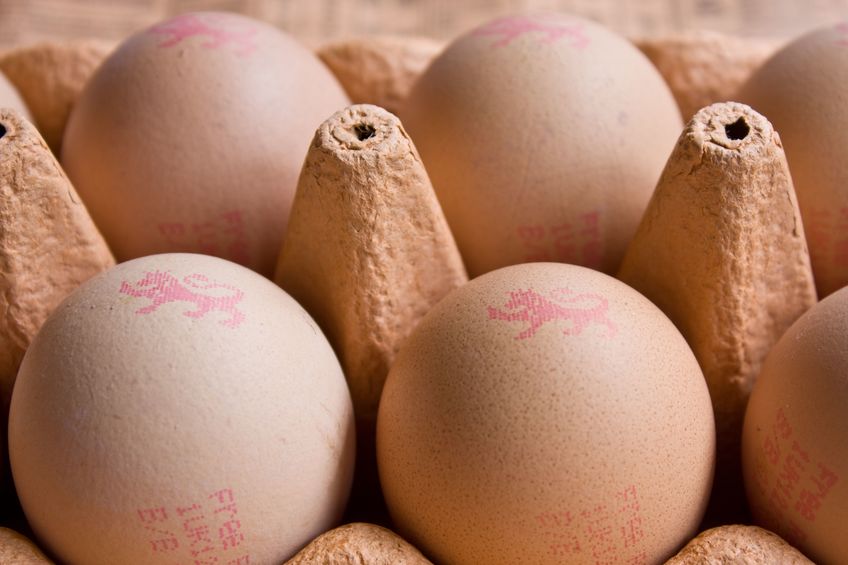
Egg producer and packer Lintz Hall Farm says a quarter-of-a-million-pound loss in the last financial year was caused by falling producer prices and increased costs.
The company, which is based in the North East of England, recorded a pre-tax loss of £260,719 in the 12 months to the end of April 2019 compared with a profit of £225,505 in the previous 12-month period.
Director Richard Tulip said in his strategic report that the business had been affected by low prices and higher costs.
"The decrease in the gross profit margin is mainly due to an increase in feed prices, coupled with a reduction in the sales prices of eggs," he said.
Veli Moluluo, managing director of the consumer foods division at the UK's biggest egg business, Noble Foods, warned during a speech at the annual conference of the NFU that egg producers had been hit by hyper deflation over recent years.
"Yes, volume is growing and that is what is driving value growth, but what is really being hidden within those numbers is that there really is significant deflation.
"I would almost term it hyper deflation. As we stand here today, six medium free range eggs are almost half the price they were 10 years ago. In certain retailers they are half the price they were 10 years ago," he said.
Latest full-year figures released by Defra show that average farm gate prices for free range eggs were down again in 2019.
The average for a dozen free range eggs in 2019 was 80.3 pence in 2018 compared with 81.8 pence the previous year. In 2017 the average farm gate price was 82.6 pence and in 2016 it was 84.3 pence.
Lintz Hall recorded a loss in 2019 on turnover that was only slightly down on the previous year - sales in 2019 were £8.91 million compared with £8.99 million in 2018.
But the company says that gross profit margin fell by 5.64 per cent to 14.58 per and it has acted to make efficiencies in the business.
"Since the end of the year the company has carried out a major reorganisation of its workforce in order to streamline the business and make significant cost savings to combat the increased feed prices that the company has suffered," said Richard Tulip in his report.
"This has resulted in a number of staff redundancies. Cash flow savings resulting from this action should begin to take effect in the latter part of the 2020 financial year.
"The directors are confident that the company will return to profitability in 2020," he said.
Scottish producer and packer Farmlay also pointed to a "challenging market" as it reported that pre-tax profits were down by 40 per cent last year.
The company, which files its accounts under the name Aberdeen & Northern Eggs Ltd, saw profits before tax fall from £2.25 million in 2018 to £1.32 million in 2019 - a fall of just over 41 per cent year on year.
Turnover was down by two per cent from £19.39 million in the 12 months to the end of May 2018 to £19 million in the same period to 2019.
Director Robert Chapman said in his report that the market had been challenging: "During this financial year, turnover is marginally down. This is due to a challenging market, although throughput volume has increased," he said.
"We therefore need to continue our investment programme in enhanced automation for the packing and grading operation to ensure we remain competitive in the market."
He said the company had installed a Moba 530 egg grading machine, along with robotics, which had increased the number of eggs that the company could pack each hour.
Other capital investment included transport, logistics and replacement equipment for the company's arable farming operation, he said.
Despite the fall in profits, Robert Chapman said he was "pleased with the results considering the uncertainty of the current economic climate. The retail market is still very competitive. Consumption of eggs, however, continues to rise. This is positive for the industry and the company."
"It is hoped that the strategy of keeping all aspects of rearing and production, along with distribution, under the control of the company will continue in keeping the business competitive."
Robert Gooch, chief executive of the British Free Range Egg Producers' Association (BFREPA) has said that many free range producers are struggling financially.
He said during the NFU conference that real terms deflation in free range eggs had been happening for some time. "While value has been going up, it has not been going up as much as volume," he said.
"Producers have for some time been producing more eggs for less money. That is, I am afraid, a symptom of the increasing growth of free range over the last few years.
"Producers are struggling," he said," A lot of producers are leaving packers at the moment."
However, Mr Gooch said he thought it likely that packers would respond positively on price over the next nine months.
